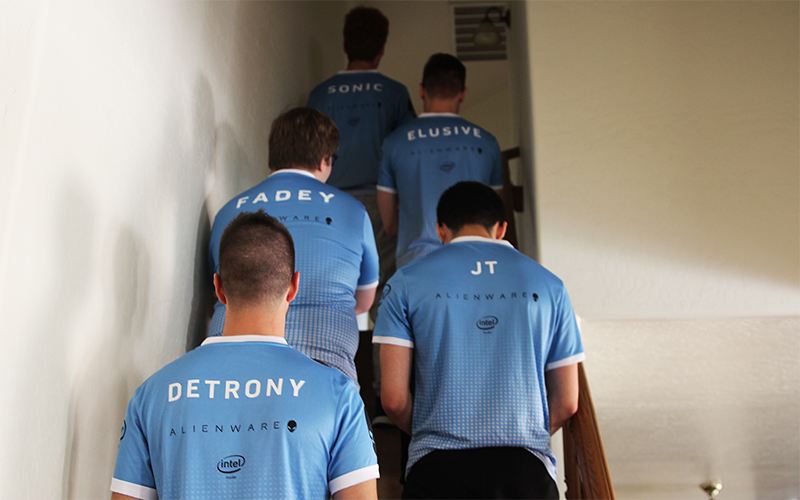
Bravado Gaming members, from top, Aran “Sonic” Groesbeek, Ruan “ELUSIVE” van Wyk, Rhys “Fadey” Armstrong, Johnny “JT” Theodosiou and Dimitri “Detrony” Hadjipaschali get ready for competition. They left their homes in South Africa for the competition in North America. (Photo by Luke Wright/Cronkite News)
PHOENIX – Every year players uproot their lives to join their professional sports teams, often on the other side of the country.
For the esports organization Bravado Gaming, a cross-country move would have been welcome. Instead, it had to send its “Counter-Strike: Global Offensive” team to another continent to compete.
Welcome to Phoenix.
Bravado is based in South Africa, but the opportunities for major tournaments are few and far between.
So last January, the six Bravado boys — in their late teens and 20s — moved nearly 10,000 miles to a house in Phoenix and started their new routines, which include eight to 10 hours of practice each day. They live together, work together and, when they have time, go out together.
“The biggest challenge moving to America for myself, and the five others as well, is sacrificing and leaving our family and friends,” Dimitri “Detrony” Hadjipaschali said, “leaving our comfort zone of South Africa where we compete in our own rooms and the competitors on a daily basis. This is completely different.”
The practice isn’t unprecedented and speaks to the growing acceptance of video-gaming competition. Brazil’s Luminosity made a similar move and found success. Sponsors are key and one of the biggest for Bravado Gaming is Alienware, a computer hardware subsidiary of Dell. Bravado Gaming begins Mountain Dew League competition– run by the E-Sports Entertainment Association League — on May 21.
The team had dominated what little competition there is in South Africa for several years, placing first or second in every major tournament in 2016 and 2017.
The organization decided to make a move to help the team develop and gain more exposure. They unveiled “Project Destiny,” an ambitious plan to send the team to North America for a year and see what progress can be made.
The team consists of Hadjipaschali, coach Tiaan “T.C.” Coertzen, Aran “Sonic” Groesbeek, Ruan “ELUSIVE” van Wyk, Johnny “JT” Theodosiou and Rhys “Fadey” Armstrong.
Coertzen is one of the older members of the team and the only one who has experience living on his own. Thanks to his past experiences, he believes he has to fill the role of both coach and dad.
“I think, at the start especially, I was taking on more of a dad rule,” Coertzen said, “But it’s easier for me because I was living on my own for seven years.”
Since most people in South Africa have their own domestic service, Coertzen said, the younger players are learning how to live on their own, and how to live with other people, too.
“Here it’s different. You have to cook for yourself. Someone has to clean the dishes and mop the floors,” Coertzen said. “I even started to make a schedule. You have to get those fundamentals into the players.”
The team’s challenges include more than just learning how to cook. For Hadjipaschali, one of the biggest obstacles was leaving his comfort zone..
Despite the challenges, the players are taking advantage of their time in Phoenix and are happy to have found a new home, even if it is only temporary.
Van Wyk has been pleased with the move and although he hasn’t had a chance to go sightseeing yet, he has loved being able to feel like a real professional.
“We have been really busy since we got here,” he said, “We are pretty much putting in eight to 10 hours of work every day and just spending time together with the team every day.”
Those hours include team practice, individual practice, one-on-ones with coach Tiaan, matches and breaks for lunch and dinner. Many of the players also spend their free time at night playing with other professionals in FPL (FACEIT Pro League) which is basically pickup games with fellow pro players across the North American “Counter-Strike” scene.
The team’s plan for now is to spend its time in the United States in two blocks of six months, with a break of a few weeks in between to go home. If the team is able to prove itself and make it to the Pro League, a “Counter-Strike” league reserved for the 12 best teams in North America, and is able to do well in qualifiers for big international tournaments, its stay might be extended.
At one time, the team was five players and a coach spread throughout South Africa who would practice when they could and participate in mostly just local tournaments.
Now the players and coach are under one roof and able to work on their craft all day. They are looking to compete against some of the best competition in the world and bring some respect back to South Africa gaming.